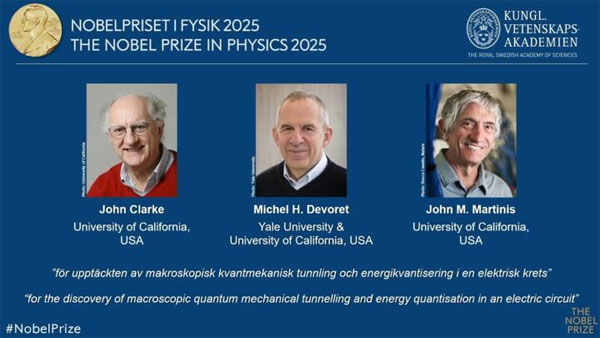Daijiworld Media Network - New Delhi
New Delhi, Oct 7: The 2025 Nobel Prize in Physics has been awarded to three American scientists — John Clarke, Michel H. Devoret, and John M. Martinis — for groundbreaking experiments that made the elusive world of quantum mechanics visible at a macroscopic scale.
Their work has paved the way for the next generation of quantum technologies, including quantum cryptography, quantum computing, and ultra-sensitive quantum sensors.
Announcing the award, the Royal Swedish Academy of Sciences cited the trio’s experimental discovery of macroscopic quantum mechanical tunnelling and energy quantisation in an electrical circuit — a system large enough to be held in the hand.

“The 2025 #NobelPrize in Physics has been awarded to John Clarke, Michel H. Devoret, and John M. Martinis for the discovery of macroscopic quantum mechanical tunnelling and energy quantisation in an electric circuit,” the Academy said in its official statement.
From Theory to Tangible Reality
Quantum mechanics — a century-old field — allows particles to “tunnel” through energy barriers, a phenomenon typically observed only at atomic or subatomic scales. The laureates demonstrated that these effects could be harnessed in systems involving millions of particles, showing quantum physics in action in real-world, macroscopic devices.
Their experiments involved specialized electrical circuits that exhibited quantum properties such as discrete energy levels and quantum tunnelling, phenomena previously thought to be relevant only at microscopic scales.
“It is wonderful to be able to celebrate the way that century-old quantum mechanics continually offers new surprises. It is also enormously useful, as quantum mechanics is the foundation of all digital technology,” said Olle Eriksson, Chair of the Nobel Committee for Physics.
Academic Institutions and Prize Details
• John Clarke is affiliated with the University of California, Berkeley
• John M. Martinis is from the University of California, Santa Barbara
• Michel H. Devoret is associated with both Yale University and UC Santa Barbara
The three laureates will share the prize money of 11 million Swedish kronor, approximately USD 1 million.
Their work adds to the foundation of existing quantum-based technologies, such as transistors in modern microchips, and accelerates progress toward fully realized quantum computing systems.
Context and Predecessors
This year’s award follows the 2024 Nobel Prize in Physics, which was conferred on John J. Hopfield and Geoffrey E. Hinton for pioneering contributions to machine learning and artificial neural networks — highlighting a broader recognition of foundational science driving future technologies.